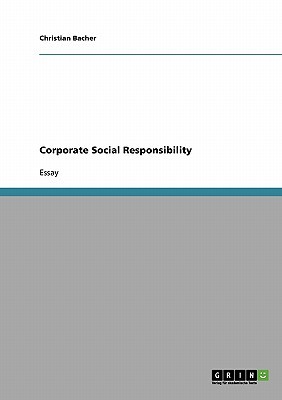
- We will send in 10–14 business days.
- Author: Christian Bacher
- Publisher: GRIN Verlag
- ISBN-10: 3638636569
- ISBN-13: 9783638636568
- Format: 14.8 x 21 x 0.3 cm, softcover
- Language: English
- SAVE -10% with code: EXTRA
Reviews
Description
Essay from the year 2005 in the subject Business economics - Business Management, Corporate Governance, grade: A+, University of Otago (Department of Management), course: International Management, language: English, abstract: While countries negotiate the opening of borders for foreign investments and dropping trade barriers in favour of powerful, worldwide acting multinational corporation (MNCs), non-governmental organisations (NGOs) gather people and power for the disadvantaged people of these developments. Somehow the idea of a free, global market economy is not approved by everybody. The capitalistic paradigm seems to have an inbuilt error, the promise of wealth and welfare does not fulfil itself. That is roughly the viewpoint of the supporters of the World Social Forum (World Economic Forum, 2005). Although a subjective point of view, the arguments are connected to this essay's main notion, corporate social responsibility. They lead to the questions why corporate social responsibility should have a right to exist, what proves its validity and what are the reasons for and against it? The following text should provide in depth answer to that. To do that the scene needs to be set at first. This discussion is based upon the definitions of market economy and globalisation. An introduction to the characteristics of MNCs and the reasons why MNCs deserve a closer consideration in this discussion follows. Then corporate social responsibility (CSR) will be defined, its theoretical fundaments will be presented and it will be distinguished from Corporate Citizenship. This is followed by the arguments of its strongest adherents, non-governmental organisations, and an description of NGO-tactics to enforce CSR. The 'players' of CSR also include governments and, of course, corporations. Their involvement in and standpoint towards CSR will be presented. Nevertheless, strong arguments against CSR exist, too. But the responses to these arguments are also justifiable. After thi
EXTRA 10 % discount with code: EXTRA
The promotion ends in 11d.07:06:09
The discount code is valid when purchasing from 10 €. Discounts do not stack.
- Author: Christian Bacher
- Publisher: GRIN Verlag
- ISBN-10: 3638636569
- ISBN-13: 9783638636568
- Format: 14.8 x 21 x 0.3 cm, softcover
- Language: English English
Essay from the year 2005 in the subject Business economics - Business Management, Corporate Governance, grade: A+, University of Otago (Department of Management), course: International Management, language: English, abstract: While countries negotiate the opening of borders for foreign investments and dropping trade barriers in favour of powerful, worldwide acting multinational corporation (MNCs), non-governmental organisations (NGOs) gather people and power for the disadvantaged people of these developments. Somehow the idea of a free, global market economy is not approved by everybody. The capitalistic paradigm seems to have an inbuilt error, the promise of wealth and welfare does not fulfil itself. That is roughly the viewpoint of the supporters of the World Social Forum (World Economic Forum, 2005). Although a subjective point of view, the arguments are connected to this essay's main notion, corporate social responsibility. They lead to the questions why corporate social responsibility should have a right to exist, what proves its validity and what are the reasons for and against it? The following text should provide in depth answer to that. To do that the scene needs to be set at first. This discussion is based upon the definitions of market economy and globalisation. An introduction to the characteristics of MNCs and the reasons why MNCs deserve a closer consideration in this discussion follows. Then corporate social responsibility (CSR) will be defined, its theoretical fundaments will be presented and it will be distinguished from Corporate Citizenship. This is followed by the arguments of its strongest adherents, non-governmental organisations, and an description of NGO-tactics to enforce CSR. The 'players' of CSR also include governments and, of course, corporations. Their involvement in and standpoint towards CSR will be presented. Nevertheless, strong arguments against CSR exist, too. But the responses to these arguments are also justifiable. After thi


Reviews